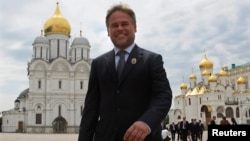Kaspersky Lab, the Russian anti-virus software maker, plans to open an office in the Washington area to spearhead sales to the U.S. government, a bid to offset slowing demand for its programs for consumers.
Kaspersky makes one of the top-selling anti-virus programs in the United States, where it has gained market share in recent years against products from Symantec Corp, Intel Corp's McAfee and Trend Micro Inc.
Yet the Moscow-headquartered company has struggled to make inroads with the U.S. government, one of the world's largest buyers of technology products. Security experts say that the U.S. government typically avoids Russian products out of concern they could have hidden functions that might allow Moscow to penetrate U.S. networks.
Eugene Kaspersky, the company's co-founder and chief executive officer, told the Reuters Cybersecurity Summit that his programs have no such hidden functions. But he said he will build products aimed at the U.S. market in the United States, to assuage any concerns.
"American companies are 100 percent trusted, so we have to prove we are 200 percent trusted,'' Kaspersky said. "We have to be more American than Americans.''
Kaspersky said he will hire U.S. citizens to work in the new office and write, test and compile computer programs. The company already has a regional headquarters in Woburn, Massachusetts, and an anti-virus lab in Seattle, but does not produce software in the United States.
The new U.S. team will work on an operating system for computers that control electric generators, water systems, factories and other industrial facilities.
Kaspersky said the company is almost ready to test an early version in Russia. He said he hopes the industrial control software will one day account for about a third of its sales.
As global sales of personal computers decline, Kaspersky Lab wants to diversify its portfolio away from PC anti-virus software. Last year global PC sales posted their biggest decline in more than two decades, hurt by a shift to tablets and smartphones.
Kaspersky said falling consumer sales in 2012 crimped overall revenue growth but did not elaborate. The company still has positive revenue growth when sales to businesses are included "but it's a little bit close to flat,'' he said.
Revenue grew 14 percent in 2011 to $612 million.
Kaspersky makes one of the top-selling anti-virus programs in the United States, where it has gained market share in recent years against products from Symantec Corp, Intel Corp's McAfee and Trend Micro Inc.
Yet the Moscow-headquartered company has struggled to make inroads with the U.S. government, one of the world's largest buyers of technology products. Security experts say that the U.S. government typically avoids Russian products out of concern they could have hidden functions that might allow Moscow to penetrate U.S. networks.
Eugene Kaspersky, the company's co-founder and chief executive officer, told the Reuters Cybersecurity Summit that his programs have no such hidden functions. But he said he will build products aimed at the U.S. market in the United States, to assuage any concerns.
"American companies are 100 percent trusted, so we have to prove we are 200 percent trusted,'' Kaspersky said. "We have to be more American than Americans.''
Kaspersky said he will hire U.S. citizens to work in the new office and write, test and compile computer programs. The company already has a regional headquarters in Woburn, Massachusetts, and an anti-virus lab in Seattle, but does not produce software in the United States.
The new U.S. team will work on an operating system for computers that control electric generators, water systems, factories and other industrial facilities.
Kaspersky said the company is almost ready to test an early version in Russia. He said he hopes the industrial control software will one day account for about a third of its sales.
As global sales of personal computers decline, Kaspersky Lab wants to diversify its portfolio away from PC anti-virus software. Last year global PC sales posted their biggest decline in more than two decades, hurt by a shift to tablets and smartphones.
Kaspersky said falling consumer sales in 2012 crimped overall revenue growth but did not elaborate. The company still has positive revenue growth when sales to businesses are included "but it's a little bit close to flat,'' he said.
Revenue grew 14 percent in 2011 to $612 million.






